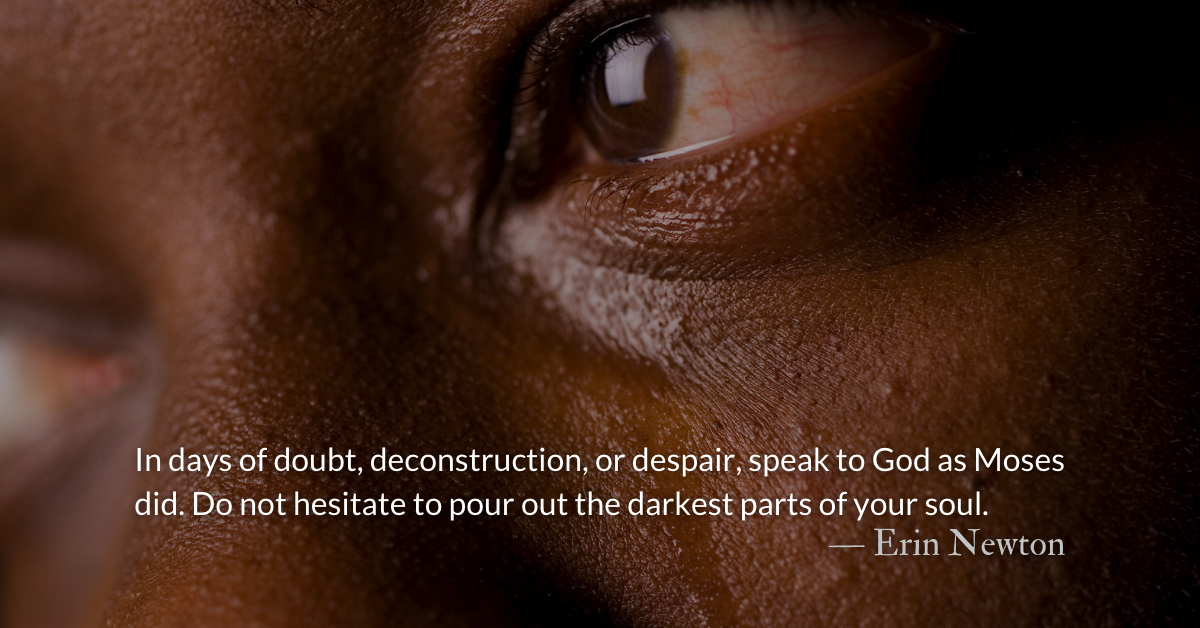Scripture Focus: Exodus 33:11-14
11 The Lord would speak to Moses face to face, as one speaks to a friend. Then Moses would return to the camp, but his young aide Joshua son of Nun did not leave the tent.
12 Moses said to the Lord, “You have been telling me, ‘Lead these people,’ but you have not let me know whom you will send with me. You have said, ‘I know you by name and you have found favor with me.’ 13 If you are pleased with me, teach me your ways so I may know you and continue to find favor with you. Remember that this nation is your people.”
14 The Lord replied, “My Presence will go with you, and I will give you rest.”
Reflection: Being Candid with God
By Erin Newton
Panim—that is the Hebrew word for face. It stands for our simple anatomical features. By our faces, we can be pinpointed out of a crowd. Faces are personal. Our faces reveal our innermost feelings. Faces can tell a story.
The word can also mean “presence.” When God said his Presence would go with Moses, he reassured Moses that he would be near. God’s attentive face was a sign of blessing.
So, what does it mean to talk to God panim to panim—face to face? At the end of this chapter, we know that it cannot mean literal conversations with God and Moses looking at one another. Such a sight would be a death sentence.
Face to face is intimacy. In English, we might call this a heart to heart, speaking in confidence, or straightforward dialogue. It is blunt and minces no words because it is a conversation between friends. Moses and God talked openly.
We often look at Moses as a rare hero in the Bible. He was special, unique, and gifted. He was the only person in the Exodus story that enjoyed the intimate relationship of being in God’s presence.
What do you say when you can speak freely before God?
You complain. Moses often referred to God’s people as “these people.” He got frustrated with their complaining, their lack of faith, and their disrespect.
You question the plan. Moses had no idea how God would help him accomplish this task. He said exactly what he was worried about.
You recall the truth about God’s love. Moses repeated the truth that God chose these people. He reminded God, and in doing so, preached to his own heart.
You ask God to fill in the gaps where you lack wisdom. Moses was well-educated and had the most intimate relationship with God. This relationship, however, did not mean he knew everything. He needed God’s guidance.
And through all of this, God was still pleased with Him. Moses’ frustration, anger, bitterness, doubt, questions—all of this was acceptable. God spoke to him as a friend.
Being honest and open with God should not be something we fear. Like Moses, we have constant access to the presence of God. We can speak plainly to him, face to face.
In days of doubt, deconstruction, or despair, speak to God as Moses did. Do not hesitate to pour out the darkest parts of your soul.
Divine Hours Prayer: The Request for Presence
Let my cry come before you, O Lord; give me understanding, according to your word.
Let my supplication come before you; deliver me, according to your promise. — Psalm 119.169-170
– From The Divine Hours: Prayers for Springtime by Phyllis Tickle.
Today’s Reading
Exodus 33(Listen 3:49)
Luke 15(Listen 4:19)
Write With Us
We want to help students called to ministry improve their writing and gain experience in the unique area of devotional writing while getting coaching, and a small scholarship.
Read more about Unveiled
On Mount Sinai, God revealed more to Moses than he had revealed to any human since Adam and Eve.








